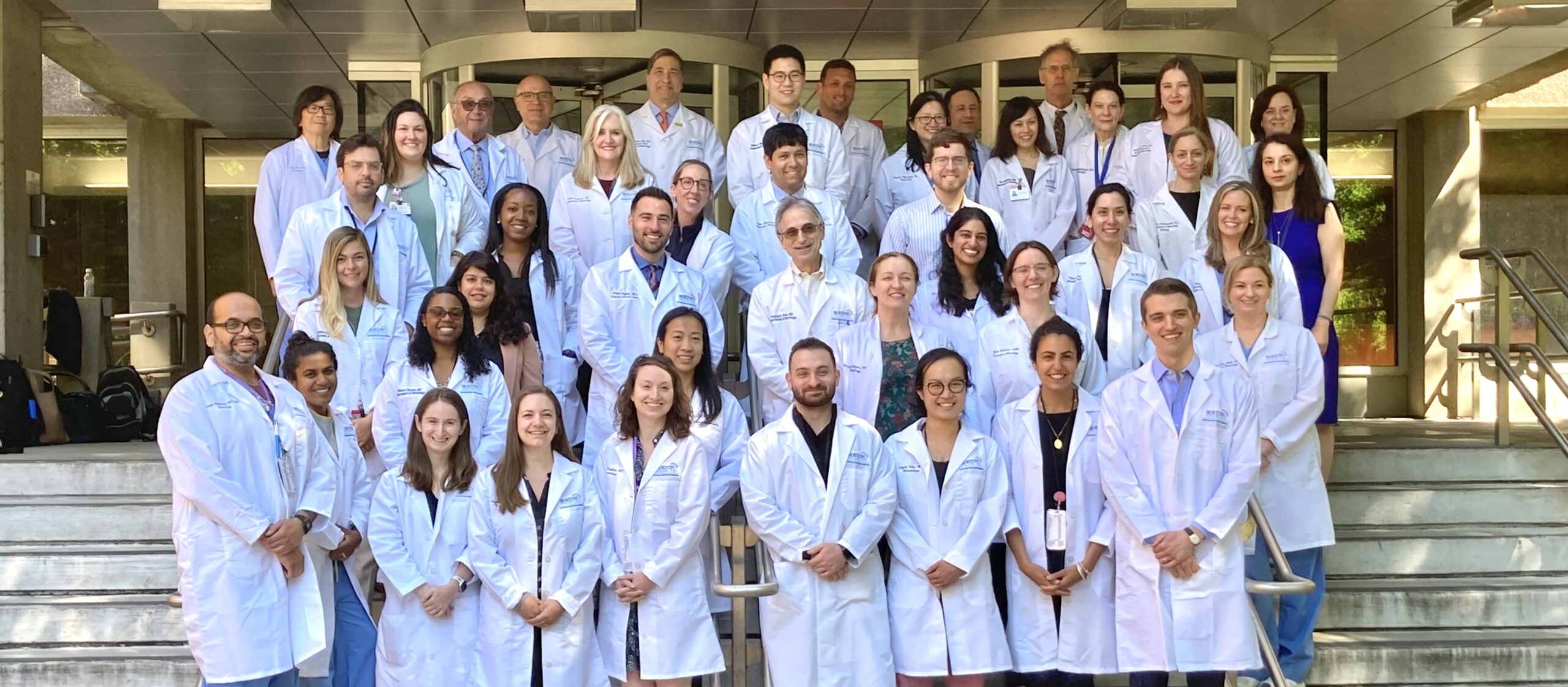Program Overview
The primary goal of the Boston University Medical Center Training Program in Neurology is to provide house officers with the knowledge and skills to competently diagnose and care for patients with neurological disease. Our large and diverse faculty encompasses a wide range of interests in neurology and strives to instill a sense of learning, teaching, and cooperation through instruction and supervision of each resident. Each resident has a chance to see an abundant and appropriate clinical case material, presenting the “many faces of neurologic disease.” Our Program offers the resident experience in all facets of neurological study through exposure to the strengths of each affiliated institution, resulting in the highest quality of neurological training available anywhere.
Schedule
The rotation schedule meets the training requirements to sit for the American Board of Psychiatry and Neurology (ABPN) examinations, as determined by the Accreditation Council of Graduate Medical Education (ACGME) of the American Medical 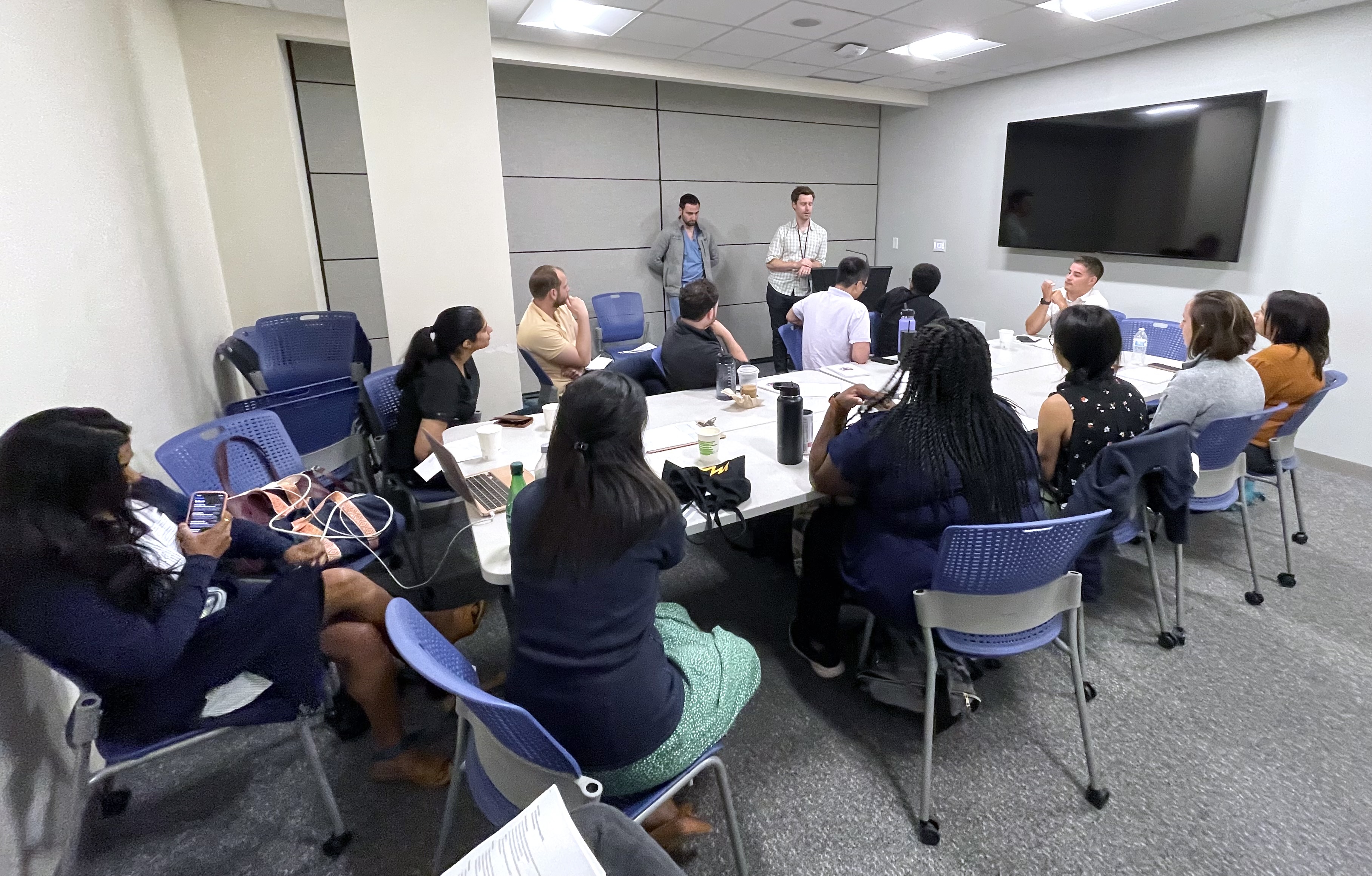 Association (AMA), the official accrediting bodies for internship, residency and fellowship training in the United States. These rotations are adjusted based upon the recommendations of the ACGME and the ABPN to ensure Board eligibility upon completion of the Program. The Program is driven by educational and certification requirements.
Association (AMA), the official accrediting bodies for internship, residency and fellowship training in the United States. These rotations are adjusted based upon the recommendations of the ACGME and the ABPN to ensure Board eligibility upon completion of the Program. The Program is driven by educational and certification requirements.
The main goal of the intern (PGY-1) year is to establish a solid background in internal medicine and residents participate in inpatient and outpatient general medicine at BMC and VAMC.
During the PGY-2 year, the resident learns the fundamentals of neurological disease at Boston Medical Center (BMC) and the Boston Veterans Administration Medical Center (BVAMC). The first year resident evaluates and manages patients with diverse neurological problems, gaining an understanding of the diseases of the nervous system by working both in the inpatient and outpatient services. Emphasis is placed on the functional approach to patient care through critical intervention and rehabilitation. It is in this year that the resident will start their continuity clinic that they will continue for the next three years. Rotations in neuroradiology will allow the resident to hone their skills at imaging the nervous system.
In the PGY-3 year, the resident starts to make their transition to a senior resident. As a senior resident, she/he supervises the Inpatient Neurology Service at BMC, directing the work of first year residents and medical students. Elective rotations are provided to allow the resident to explore interests in specific areas of neurology and to begin a research project. This year, the resident will spend 3 months in Pediatric Neurology both in the inpatient and outpatient settings.
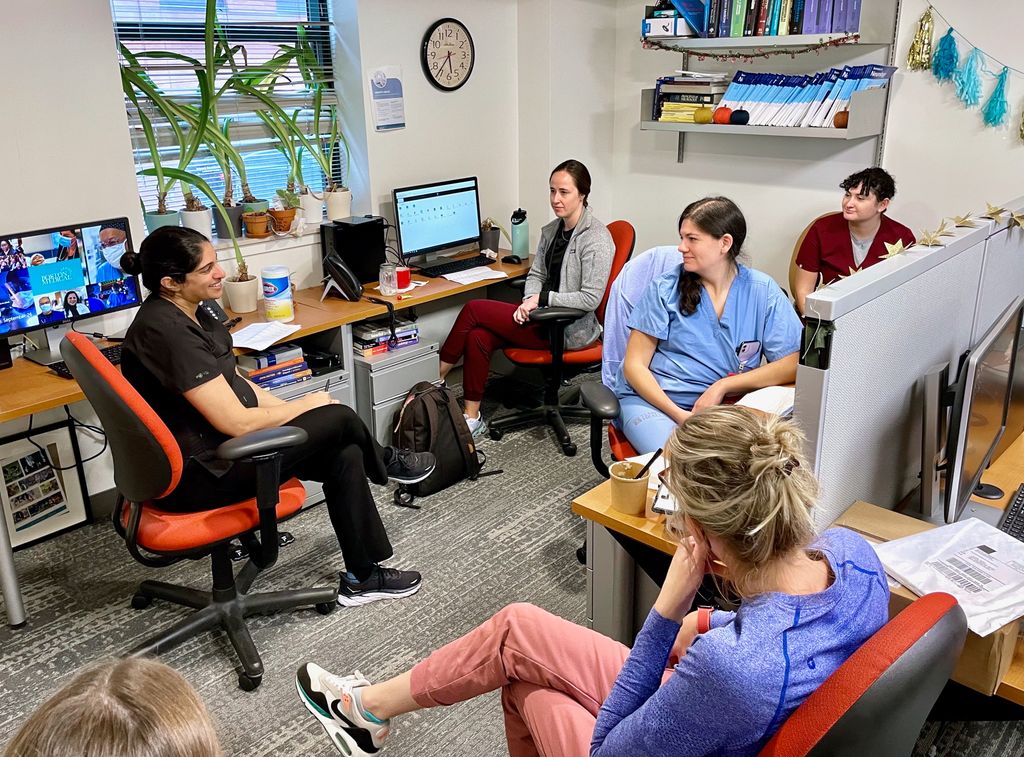 During the PGY-4 and final year of residency training, the resident is expected to function at a high and independent level. He/she supervises the Neurology Service as senior resident at BVAMC, and the Consult Service at both BVAMC and BMC. Rotations in Neurophysiology (EMG and EEG) introduce the resident to basic neurodiagnostic testing techniques while reviewing peripheral and central nervous system anatomy. Elective rotations may be spent in research or clinical subspecialties at the Boston University affiliated institutions, other facilities within the Metropolitan Boston area, or in other cities or countries based on the resident’s performance and area of interest. Independent decision-making and teaching are encouraged with appropriate supervision by a senior staff member. It is during this year that the transformation from resident to “attending” is apparent.
During the PGY-4 and final year of residency training, the resident is expected to function at a high and independent level. He/she supervises the Neurology Service as senior resident at BVAMC, and the Consult Service at both BVAMC and BMC. Rotations in Neurophysiology (EMG and EEG) introduce the resident to basic neurodiagnostic testing techniques while reviewing peripheral and central nervous system anatomy. Elective rotations may be spent in research or clinical subspecialties at the Boston University affiliated institutions, other facilities within the Metropolitan Boston area, or in other cities or countries based on the resident’s performance and area of interest. Independent decision-making and teaching are encouraged with appropriate supervision by a senior staff member. It is during this year that the transformation from resident to “attending” is apparent.
Below is a table with sample schedule for every year of residency.
| PGY-1 |
|
| PGY-2 |
|
| PGY-3 |
|
| PGY-4 |
|
Research
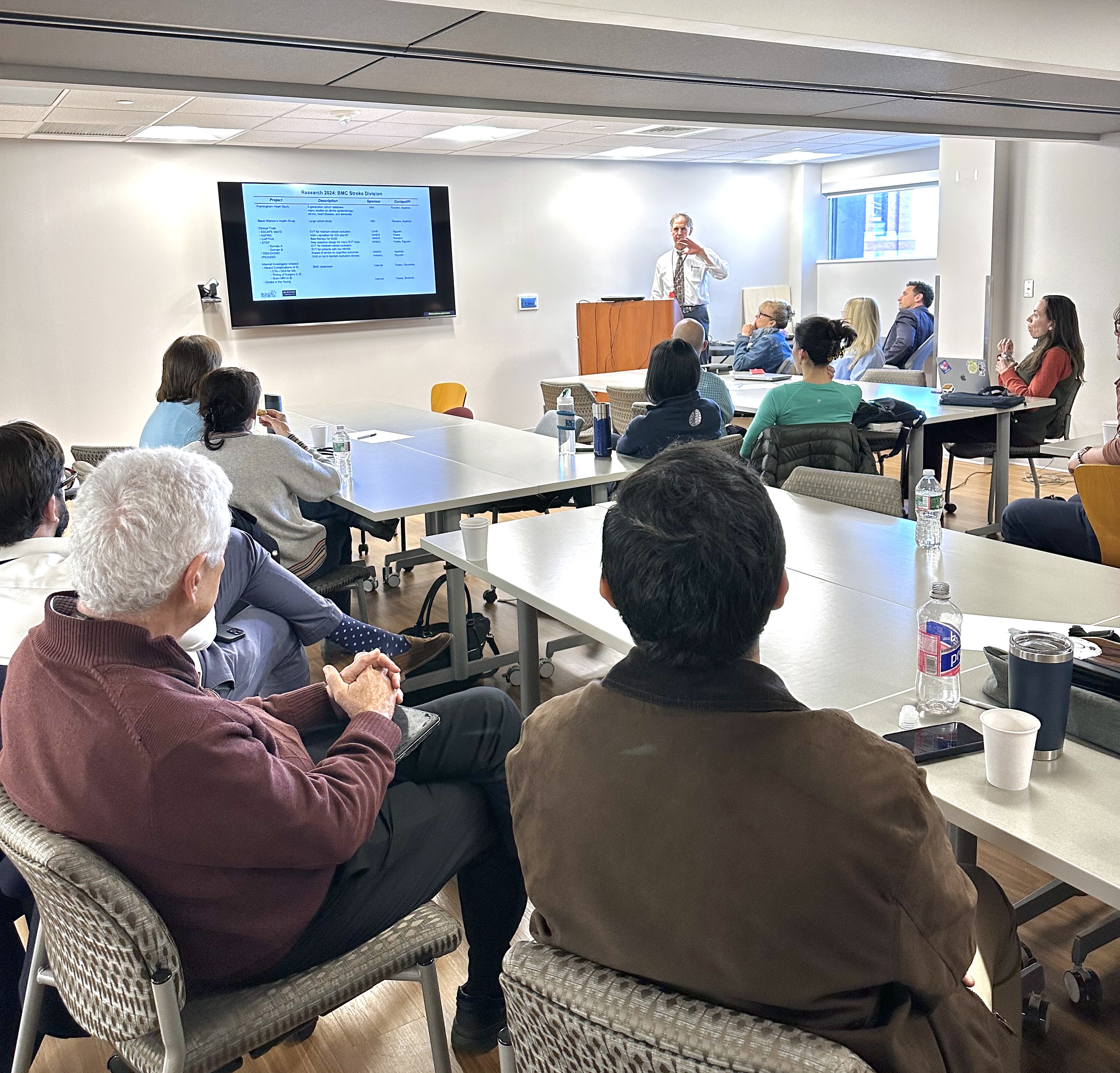 Research is an important part of residency training at Boston University Medical Center. Residents are encouraged to set up research projects that they are interested in with faculty guidance. In addition to developing their own projects under faculty guidance, many residents choose to partner with research institutes at Boston University Medical Center. Some examples include:
Research is an important part of residency training at Boston University Medical Center. Residents are encouraged to set up research projects that they are interested in with faculty guidance. In addition to developing their own projects under faculty guidance, many residents choose to partner with research institutes at Boston University Medical Center. Some examples include:
- Framingham Heart Study – a large-scale, longitudinal, ongoing study gathering prospective data on biological and lifestyle risk factors of cardiovascular and neurological diseases, initiated in 1948 currently spanning three generations of participants.
- Boston University Alzheimer’s Disease Center – a research center for innovative research in Alzheimer’s, one of twenty-nine in the U.S. funded by the National Institutes of Health.
- Chronic Traumatic Encephalopathy Center – a leading research center in the short- and long-term effects of CTE led by Drs. Robert Stern and Ann McKee – recently named as TIME’S Annual List of the 100 Most Influential People in the World.
- Amyloidosis Center – a research center with prolific publications and a multidisciplinary, international referral center for diagnosis and treatment of amyloidosis.
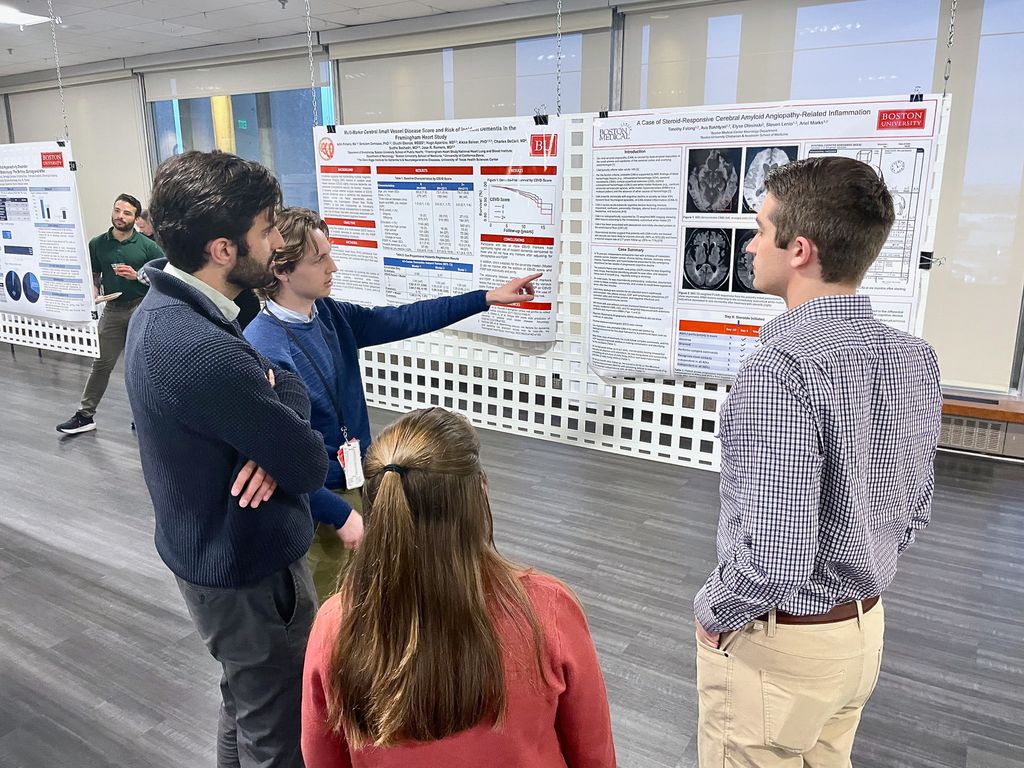 Our Department’s commitment to research may be seen both in the activities of the faculty and in the faculty’s dedication to engaging residents and students in research opportunities. These efforts are highlighted every year in April when our Department holds its annual Carlos S Kase BU Neurology Research Symposium. The Kase Symposium grew out of COR
Our Department’s commitment to research may be seen both in the activities of the faculty and in the faculty’s dedication to engaging residents and students in research opportunities. These efforts are highlighted every year in April when our Department holds its annual Carlos S Kase BU Neurology Research Symposium. The Kase Symposium grew out of COR
TEX, a mentoring program that pairs residents and medical students with department faculty on research and quality improvement initiatives. Each year the keynote address is presented by a nationally celebrated BU researcher. The symposium highlights current research efforts through a poster session and live presentations. Many of the posters presented at the Symposium are also presented at conferences both nationally and internationally.
As Neurology becomes more and more specialized, the role of fellowship training becomes more important. We are proud to offer five of our own fellows
hips and you can see those by clicking on the Fellowships on the right of your screen. We are also proud of our resident placement at other institutions across the country.
